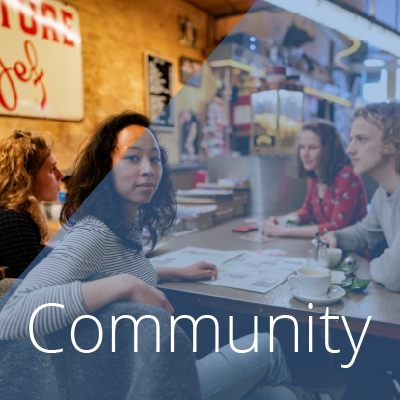Blog
Unshackling educational thinking: Evergreen’s four no’s
In this third blog I discuss The Evergreen State College’s radically different approach to the way it has organized its liberal arts curriculum. Evergreen State is a relatively young liberal arts college that was founded by the State of Washington in 1967. Its governor Dan Evans had the deliberate intention to “unshackle our educational thinking from traditional patterns.” something that was needed in the light of the turbulent times the USA went through. This is how the college lays out its mission four years later in its first course bulletin:
Our increasing concern for the quality of our natural environment, the huge problems in the great cities of our land, new patterns in the relationships among racial groups and in our sensitivity to ideas of social justice, the complexity of American involvements abroad, shifts in our moral values, and the emergence of new styles of personal life are only some of the alterations that have pressed themselves on our consciousness. […]In many ways, powerful trends like these raise fundamental issues about the role of education in our society. In an occupational context alone, does one train for jobs that may well become obsolete with in a very few years, or for jobs that have not yet been conceived in our world of rapidly changing technology? (Evergreen State College Bulletin 1971-1972),
In order to meet these challenges Evergreen State opted for a radically different approach, summarized by four no’s: no academic departments, no academic requirements, no faculty rank, no grades. In essence Evergreen State’s curriculum today still adheres to these basic precepts.
First and foremost, students do not take courses in say sociology or physics, but in problem oriented themes, called programs. Many of these programs are taught by two instructors rather than one, and ideally these come from different subdisciplines thus ensuring a certain level of interdisciplinarity. Take for example the Health and Human Development program which is taught by a biologist and a psychologist, or the Resource Rebels program on Environmental Justice movements taught by an anthropologist and a geographer.
Secondly, students can fully immerse themselves in such a theme, because they take one program at a time over a 10 week period (instead of 2 15 week semesters, Evergreen State operates 4 10 week quarters). In such a period a program meet four days a week for both a morning and afternoon session. Such sessions take a wide variety of forms ranging from conventional lectures to group work, seminars and field work.
A third distinctive element of Evergreen State is that students are totally free in designing their curriculum and do not have to navigate the maze of requirements that is so common in ordinary liberal arts colleges or mono-disciplinary studies. Although Evergreen encourages them to formulate an area of emphasis, in principle students are completely free to make their own collection of programs, based upon what interests and motivates them. In addition to completing a set number of course credits students in addition write a concluding academic statement of no more than 750 words in which they reflect upon their education.
Fourthly, rather than giving students grades Evergreen makes use of narrative evaluations , because it believes that these constitute a more meaningful way of providing feedback on the learning process than grades. The evaluations are shared with the students during evaluation week and subsequently formally recorded. Students will in turn evaluate the faculty and are also required to complete a self-evaluation on their performance in the course. While this means that in principle students are unable to fail a course in the classical sense, a less than satisfactory performance – both in terms of participation as well as work delivered – can result in not awarding full course credit.
It would be easy to think that by not awarding grades the program would somehow be easy. But this seems far from being the case. Evergreen comes across as rigourous as any other college in terms of the tasks students have to fulfill in order to do well in the course. Take for example the Resource Rebels course which focus on Environmental Justice movements. In this course students write weekly reflections on the course readings, as well as for every field trip, they keep track of ‘their’ issue in the press and report about this, they conduct and ethnographic interview, prepare legislative testimony as well as a press release on a selected case. On top of that they are required to write a self-evaluation of how they have done in the course.
When speaking to students about why they choose Evergreen State, many of them pointed out that they were in particularly attracted by the openness of the program. First and foremost this applies to the almost complete freedom students have in choosing ‘programs’. It also applies to the fact that the college takes a very inclusive attitude towards the type of students it accepts. It is in principle non-selective, it’s tuition fees are modest, in particular for Washington state residents (the in-state tuition is less than 8.000 US dollars), and it expressly welcomes students of all backgrounds, including older students and war veterans.
Given the fact that Evergreen was established so expressly with a view to deal with the challenges that faced US society in the 1960’s it should not come as a surprise that the college shows a strong engagement with social issues and expressly connects through this in its program offerings. The Resource Rebel course is a good example of this: the program examines the ways in which grassroots groups and indigenous groups in particular native have developed resilience strategies in dealing with attempts by governments and corporations at extracting mineral resources, fossil fuels and other types of resource extraction. In addition to seeking to understand these movements the program also includes an activist element in that students learn to advocate for these groups as well as organize a symposium on the problem of “extractivism” for indigenous communities.
Traditionally Evergreen State devotes a lot of its programmatic attention to issues of sustainability and environmentalism. The college operates a working organic farm with students running the farm and its farmstands and using it for the organic farming practice courses. These types of vocational training are very common in US liberal arts colleges. It draws a wide variety of students ranging from those that feel that you can not understand our current food system without actually knowing how food is produced to those that have concrete plans to start a farm themselves once they finish their studies.
This view of sustainability has amongst others translated into the sustainability in prisons project . Under the mantra ‘doing good, while doing time’, the project seeks to encourage inmates and correctional staff to engage in ecological research, conservation efforts as well as make prisons more sustainable. This then exemplifies a first way the college seeks to actively connect to the wider world and cater to disadvantages groups. A second example concerns Evergreen’s longstanding relation with Native American Communities, with for example the offering a master in public administration in tribal programs that specifically seeks to equip tribal leaders with the skills to govern tribal communities.
Evergreen State’s atypical organization of its curriculum clearly reflects the times and motives that drove its founding fathers and it is remarkable that so much of these initial ideas still survive nowadays. While it would be unrealistic to assume that conventional colleges could fully adopt this educational philosophy, each of the individual separate elements are worth considering in its own right. The co-teaching for example is a great way of increasing the interdisciplinarity of courses as well as expose faculty to peer support and feedback. The quarter system through which students only focus on one theme at a time, prevent the fragmented attention that often is a result of having to take four courses at once. Narrative evaluations are certainly more informative than grades and could in any case be considered a useful supplement, when one would not want to go the way of a complete abolishing of grades. The considerable engagement of the colleges with social themes is probably the most contentious theme to be considered: for some this violates the ideal of a value free academia where the pursuit of knowledge should be the only mission of an institution; for others connecting to the wider world and using the knowledge to actually generate societal change is an integral part of the mission of the university.
In my last blogpost I will reflect on the ways in which we could adapt some of the practices that I have reviewed in this and the previous blog within the Dutch context of higher education and liberal arts programs in particular. Such proposals obviously need to be sensitive to the peculiar institutional and cultural contexts in which our schools operate. While it is absolutely certain that we can not simply transplant the models of Reed or Evergreen State to the Dutch context, we can in any case use them to critically reflect upon our own practices and maybe even change some of them to improve teaching and learning in our educational communities.
Herman Lelieveldt teaches political science at University College Roosevelt in Middelburg.
Other posts in these series on liberal arts colleges can be found here
 6 november 2015
6 november 2015
U moet ingelogd zijn om te reageren, gebruik het formulier aan de linkerkant om in te loggen met uw solis gegevens.
Gerelateerd



